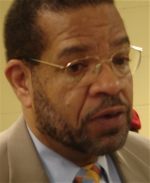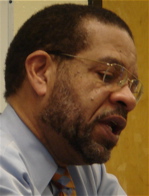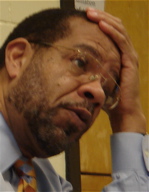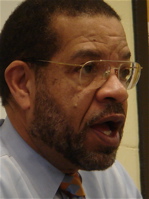
Home ●
Where We Meet ●
News ●
Announcements ●
Events ●
About Us ●
Contact Us ●
Search ●
Morning
Breakfast
Forum
Charlotte, NC
www.tueforumclt.org
Feb. 6, 2007
Net worth: It's the coin of the realm
The key to rebuilding the black community is shoring up individuals' net worth, says a veteran of a 35-year effort to build black businesses in North Carolina.
 In
an address Tuesday, Feb. 6, to the Tuesday Morning Breakfast Forum, Lew
Myers also promoted the value of creating business relationships -- and
cajoling the powerfully placed to insist that black businesspeople get a
piece of the action.
In
an address Tuesday, Feb. 6, to the Tuesday Morning Breakfast Forum, Lew
Myers also promoted the value of creating business relationships -- and
cajoling the powerfully placed to insist that black businesspeople get a
piece of the action.
Myers, director of business development of the Freelon Group, a black-owned architectural firm in the Research Triangle in which he is a stockholder, has been deeply involved in N.C. business issues since his days building Soul City, a new-community effort in Warren County in the late 1960s initiated by his father-in-law, Floyd McKissick. After his years at Soul City, Myers for many years led the state's minority business initiatives at the N.C. Department of Commerce.
Excerpts from his comments:
The need for capital
"You need money to make money. People talk about 40 acres and a mule, and people talk about reparations.
"But if people had gotten 40 acres and a mule as they were led to believe was going to happen in 1865, '66, that would have given you the net worth, the property that would have appreciated that you could pass on to your family.
"But you come out of slavery and you have no assets, you're thrust into the economy, you're sharecropping. The lack of net worth and capital to this day is a serious barrier to just participating in the economy.
"Today, I don't think the issue is race. The issue is, do you have the
money?"
 It's
a relationship business
It's
a relationship business
"We talk about it being a good ol' boy network, but the truth is people do business with people they know. This is a relationship-driven world, and we weren't in a position to have those relationships.
"We had structural segregation. I told somebody this in 1982, '83. If I was white and wanted to meet Hugh McColl, I'd find out what church he went to. I'd join the church. If he sang in the choir I'd be right next to him. I could have gotten to know him.
"As a black guy, if I had gone to that church, first of all they would have thought I was crazy, but it just wouldn't have happened.... Where we lived, who we interacted with, you weren't able to form those kinds of relationships."
Breaking the cycle
"My daughter is at N.C. State working on a Ph.D. She looked for an apartment, we looked for an apartment. We couldn't believe the rates for apartments.
"We bought a townhouse for her. We did this in 2003. Well, we'll give it to
her when she graduates. The appreciation and the equity which she will have
in it, she can take that and do something else with it. That's what net
worth allows us to do, to pass that on."
 The
Atlanta model
The
Atlanta model
"When Maynard Jackson started the Black Business Initiative in Atlanta, Maynard became mayor, they knew they were going to grow the airport. Maynard brought white business folk and black business folk together -- this was pre-legislation -- they got in a room and he just talked about why we needed to work together and how, if black folk weren't going to be involved, there just wasn't going to be any expansion of the airport.
"Folk got the message, and to this day Atlanta has a culture that if a
build's going to happen, folk look for minority entrepreneurs that they can
bring into the deal."
Making it happen
"I remember a guy who owned a business. Instead of president on his card he had 'salesman,' because when you were going out to procure business, the guy who was on the other side that you were negotiating with, he knew what the profits were, and I do believe that and I was told that many of these guys felt that that's too much money, that black folk don't need that kind of profits, so there were barriers.
"I was sitting next to a guy who heard Hugh McColl. He had been trying to get some business at the bank. McColl told him, 'Look, you call John Doe tomorrow. You tell him you had dinner with Hugh McColl, and that this needs to happen. And if it doesn't happen you call me back.'
"Guy called. It happened....
"We can't get over the importance of relationships."
Better off today?
"I think we're maybe worse off today than we were 20 years ago because at
least at that time we owned some stuff. Now we've lost what we owned. I'm
not as optimistic as I would like to be. But I've got some blood, sweat and
tears in that, and I may see it through a different lens."
 Building
a new coalition
Building
a new coalition
"Who are all of these black folk that are working in uptown Charlotte.... Who's here? What is the talent level? And what is the kind of financial strength that some of these folk have?
"I have to think there are some very bright, talented, high-income -- I'm talking $200,000, $300,000 a year. They have the beginnings of something.
"But are they thinking entrepreneurially, or are they thinking, hey, I'm here, I can ride this train for another 15 years, become a zillionaire, then retire and do something else
"I'd like to find out who all these folk are, what is their income, what is their net worth, and put 'em all together and say, 'Look, folk, do you want to own something? If you do, you'd better buy a piece of property today 'cause you can't afford it tomorrow....
"It would just be nice to have a profile that, yeah, there are 5,000 folk here that are making a half-million or more, and they live in these neighborhoods. I use Hugh McColl, but if [someone like] Hugh McColl would invite them to one of these nice towers and get them all to come together...."
--------------------------------------------------------------------------------------------
The Forum welcomes all persons to its meetings
beginning at 8 a.m. most Tuesdays of the year
at the West Charlotte Recreation Center, 2222 Kendall Drive, Charlotte, NC
down the hill from West Charlotte High School.